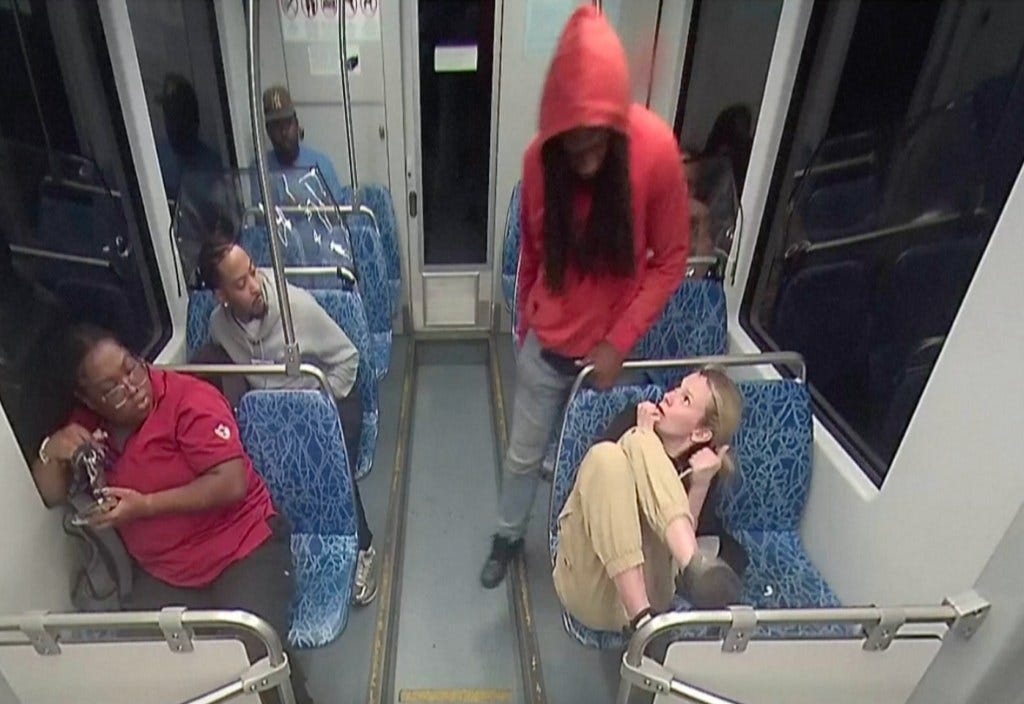What does it mean for a young refugee woman to escape war, only to be killed in a place she thought was safe?
That question has been circling in my mind ever since I watched the footage of Iryna Zarutska’s murder on the Charlotte light rail. The images refuse to leave me. They replay like scenes from a horror film—except this horror is quieter, more unsettling. It is not the spectacle of gore but the dread of silence, the ordinariness of moments before life shatters.
She boarded a train like anyone else. Sat down like anyone else. There was no warning. Then the sudden stabbing, the confusion, the rupture. She didn’t even cry out. Her hand waved weakly, perhaps calling for help, but barely seen. That small gesture—frail, human, desperate—breaks me more than anything.
And then there is the crowd. The ignorance at first. People walking past curiously, then turning away. Others standing casually a foot away, barely moving, indifferent. Elie Wiesel wrote, “The opposite of love is not hate, it’s indifference.” That is what haunts me most—the apathy in the face of suffering.
The first person to rush toward her - was that kind human another immigrant? Sometimes those who know vulnerability most intimately are the ones who cannot look away. Slowly, more people came. But still, nobody stopped the train. Nobody from the authorities appeared even ten minutes after. “Justice too long delayed is justice denied,” Martin Luther King Jr. reminded us. Here, safety delayed became safety denied.
I grieve for her. I grieve for her family, who fled a war only to lose their daughter to a different kind of violence—random, senseless, unprovoked. And I grieve for us, for the society that allowed this to unfold in such silence.
As a woman in America, I am terrified. Watching this was like looking into a mirror of my own vulnerability. Every minute was horrifying. The normalcy before. The suddenness. The indifference. The endless politicking afterward, as if her death is just another talking point. And underneath it all, the chilling truth: the fragility of safety.
We like to think of safety as a contract—a promise that public spaces will protect us, that society will respond when we are in danger, that strangers will see our humanity. But that contract is fragile. It is easily broken. It was broken for Iryna.
What will change? Perhaps nothing. Perhaps everything. Perhaps the only thing that can change is our refusal to look away, our refusal to normalize horror, our insistence that safety is not a privilege but a right.
And yet, I can’t stop asking: What does it mean for a young refugee woman to escape war, only to be killed in a place she thought was safe?



I saw this tragedy and I read your article. The compact we’re supposed to have - to feel safe in public, is fragile indeed. It caused me to think of the broader concept of individual safety.
We give up part of our freedom to live in civilized society and conform to its laws on which we agree. The alternative is a Darwinian, survival of the fittest existence.
Existing in that civilized society we have the right to expect the laws we have agreed to will be enforced. In this case they weren’t, The killer had been arrested 14 times, and some of those were for violent offenses.
Iryna Zarutsks, according to reports, had been living in a bomb shelter in her native Ukraine to protect her life from the Darwinian existence forced on her people by Vladimir Putin. Putin kills civilians in hope the horror of the deaths will result in surrender.
Iryna came to America where laws are supposed to keep people safe. Those who intentionally fail to uphold our laws due to misguided “progressive” ideology cost Iryna her life. No one in America, refugee or citizen, can be safe without those we elect to govern us honoring their oath to uphold the law and protect citizens. We must demand that they do or replace them with those who will.
RIP Iryna, we failed you.
An eloquent post. This tragedy is the result of decades of liberal mental health "experiment" attempting to show institutional care for the mentally ill was racist, cruel, and ineffective.